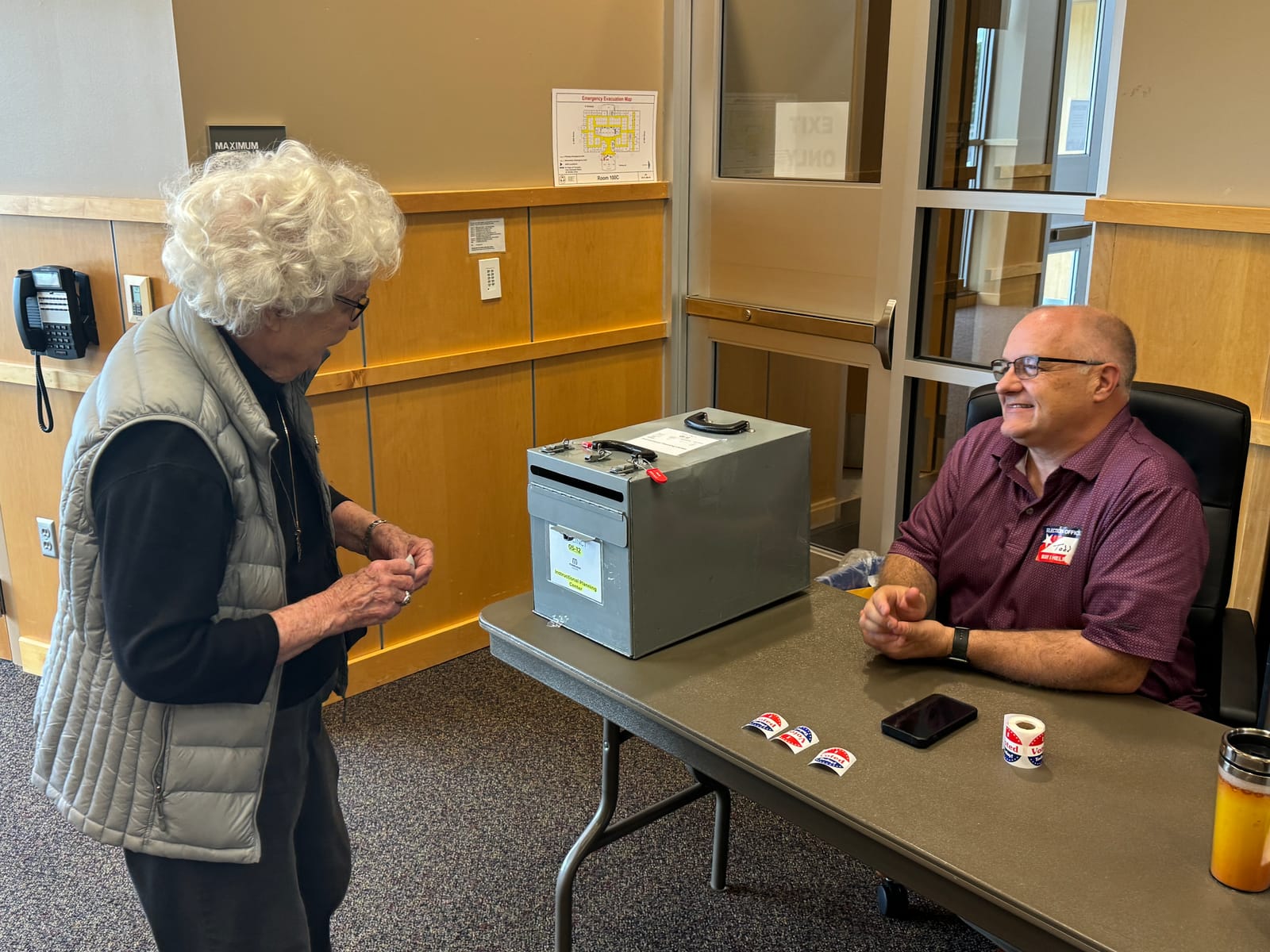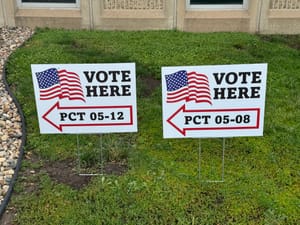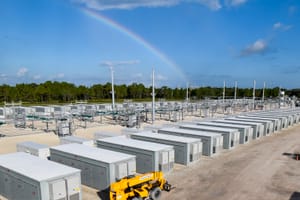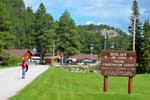The process of casting and counting votes has become a major point of discussion. Credible information can be hard to find.
The goal of this guide is to help South Dakota voters make decisions about the Nov. 5 general election and answer their questions about the process and what's on the ballot.

Sources for this guide include the South Dakota Secretary of State's office and original reporting. It only includes information on statewide and legislative races. Details about local races can be found on each county auditor's website and local media outlets.
What's in this guide
- Key election information, including dates, how to register, how to vote early, where to vote in person, when polls are open and what to bring when you vote.
- Which candidates are on the ballot for the U.S. House of Representatives, South Dakota Public Utilities Commission and state Legislature.
- Explanations of seven ballot measures that would legalize abortion, change how voters choose candidates through the use of open primaries, require people to work to receive Medicaid, remove gender references in state law, eliminate the grocery/consumables tax, legalize recreational marijuana use and keep or reject a state law on carbon pipelines.
- Ways to ask questions about the voting process or ballot information.
Registering, voting and important dates
The South Dakota Secretary of State's website includes details about how to register to vote, where to vote and how to absentee vote if you're unable to cast a ballot on Election Day and other important information.
Key dates for 2024:
- Nov. 5: General election (polls are open from 7 a.m. to 7 p.m. local time)
What to take when you vote:
All voters must show proof of identification or sign a personal identification affidavit at their polling place. Approved forms of photo identification include:
- South Dakota driver's license or nondriver ID card
- U.S. government photo ID such as a passport
- U.S. Armed Forces ID
- Current student photo identification card from a South Dakota high school or South Dakota accredited institution of higher education
- Tribal photo ID
What's on the ballot
Here are the federal and state offices and ballot issues on the Nov. 5 ballot. Candidates are listed in alphabetical order by last name. Party affiliations are Republican (R), Democratic (D), Independent (I) and Libertarian (I). Incumbents are noted with an asterisk (*).
Click on the subject line or toggle button (down arrow) below to reveal details for each contest.
U.S. President
Independent candidate Robert F. Kennedy Jr. has suspended his campaign but will still appear on the South Dakota ballot. Here are the candidates for president listed with their running mate.
Kamala Harris/Tim Walz (D)
Robert F. Kennedy/Nicole Shanahan (I)
Chase Oliver/Mike ter Maat (L)
Donald Trump/JD Vance (R)
U.S. House of Representatives
One of the 435 members of the U.S. House of Representatives in Washington represents the entire state of South Dakota. Here are the candidates for that federal office.
*Dusty Johnson (R)
The 47-year-old Pierre native is seeking a fourth term in the U.S. House after previous stints as chief of staff to former South Dakota Gov. Dennis Daugaard and Public Utilities Commissioner. Johnson is chair of the Main Street Caucus in Washington and serves on the Agriculture and Transportation/Infrastructure Committees as well as the Select Committee on China. Johnson is a fiscal conservative whose campaign has focused on border security, anti-abortion legislation and Second Amendment rights.
Sheryl Johnson (D)
Johnson is a former Republican who said she switched parties after the GOP “shifted away from the ideals of freedom, inclusion, personal responsibility and fiscal responsibility.” The mother of four daughters grew up in northeast Iowa but has lived in Sioux Falls for nearly three decades, working for the school system and running a small business. She ran for the state legislature in District 11 three times (twice for House and once for Senate) but lost to Republicans each time.
Read U.S. House election preview story here.
S.D. Public Utilities Commission
The South Dakota Public Utilities Commission regulates electric, natural gas and telephone utilities, issues permits for energy projects, pipelines and other projects and handles other duties. The PUC elects its three public utilities commissioners to staggered, six-year terms. Here are the candidates for that state office.
*Kristie Fiegen (R)
Fiegen currently serves as chairperson of the Public Utilities Commission. The Chancellor native was appointed to the PUC by Gov. Dennis Daugaard in 2011 and was re-elected in 2012 and 2018. She also served in the South Dakota House of Representatives from 1994 to 2001. Fiegen holds leadership roles in the Southwest Power Pool, a nonprofit organization that manages electric transmission for parts of 14 states, including South Dakota.
A. Gideon Oakes (L)
Oakes is a small business owner in Keystone who has been elected twice to the town board in that community. He has also served on the boards of the Black Hills & Badlands Association and United Way of the Southern Black Hills. “I want to help ensure that my children and grandchildren grow up with infrastructure that is both secure and up to date,” he said of his PUC candidacy.
Forrest Wilson (D)
Wilson is the club director for the Boys & Girls Club of Lead-Deadwood and was nominated for PUC by the South Dakota Democratic Party. He attended Northwest College in Wyoming and received his Associate of Arts degree from Chadron State College in Nebraska. “South Dakotans deserve a Public Utilities Commissioner who will advocate for the everyday utility rate payer,” Wilson said in a statement. “Right now, we don’t have that.”
Read PUC election preview story here.
S.D. Legislature
The South Dakota Legislature is comprised of 105 lawmakers from 35 legislative districts, each of which has one senator and two representatives. Find out which district you live in and where to vote.
To learn more about who is running for those offices, click on this legislative district map. It was produced by South Dakota Public Broadcasting as part of Vote South Dakota, a collaboration of media organizations to inform South Dakotans about the election process and what's on the ballot.
Here's a list of all state Senate and House candidates, some of whom are unopposed. Incumbents are indicated with an asterisk.
District 1 Senate
*Mike Rohl (R)
District 1 House
Josh Dennert (L)
Tamara Lesnar (L)
Logan Manhart (R)
Steven McCleerey (D)
Christopher Reder (R)
Mark Sumption (D)
District 2 Senate
*Steve Kolbeck (R)
District 2 House
*David Kull (R)
*John Sjaarda (R)
District 3 Senate
Carl Perry (R)
District 3 House
Al Novstrup (R)
Erin Rudner (D)
*Brandei Schaefbauer (R)
District 4 Senate
Stephanie Sauder (R)
District 4 House
Dylan Jordan (R)
Kent Roe (R)
District 5 Senate
Dennis Solberg (D)
Glen Vilhauer (R)
District 5 House
Diane Drake (D)
Josephine Garcia (R)
Amy Rambow (D)
Matt Roby (R)
District 6 Senate
Ernie Otten (R)
District 6 House
*Aaron Aylward (R)
Garret Campbell (D)
Herman Otten (R)
District 7 Senate
*Tim Reed (R)
District 7 House
*Roger DeGroot (R)
*Mellissa Heermann (R)
Blake Stevens (D)
Fedora Sutton-Butler (D)
District 8 Senate
*Casey Crabtree (R)
District 8 House
*Tim Reisch (R)
Tim Walburg (R)
Greg Zimmerman (L)
District 9 Senate
Joy Hohn (R)
District 9 House
Beverly Froslie Johnson (D)
Tesa Schwans (R)
*Bethany Soye (R)
District 10 Senate
*Liz Larson (D)
District 10 House
Bobbi Andera (R)
*Erin Healy (D)
*Kameron Nelson (D)
District 11 Senate
Steve Natz (D)
Chris Karr (R)
District 11 House
Aaron Matson (D)
Sonja Mentzer (D)
*Brian Mulder (R)
Keri Weems (R)
District 12 Senate
*Arch Beal (R)
Clay Hoffman (D)
District 12 House
JR Anderson (D)
*Amber Arlint (R)
*Greg Jamison (R)
Erin Royer (D)
District 13 Senate
Sue Peterson (R)
Ali Rae Horstead (D)
District 13 House
John Hughes (R)
*Tony Venhuizen (R)
District 14 Senate
Sandra Henry (D)
*Larry Zikmund (R)
District 14 House
Keith Block (D)
Tony Kayser (R)
B.J. Motley (D)
*Taylor Rehfeldt (R)
District 15 Senate
Brenda Lawrence (R)
Jamie Smith (D)
District 15 House
Brad Lindwurm (R)
Erik Muckey (D)
Joni Tschetter (R)
*Kadyn Wittman (D)
District 16 Senate
Kevin Jensen (R)
District 16 House
*Karla Lems (R)
Matthew Carl Ness (D)
Richard Vasgaard (R)
District 17 Senate
*Sydney Davis (R)
District 17 House
*Chris Kassin (R)
Ray Ring (D)
*Bill Shorma (R)
District 18 Senate
Sarah Carda (D)
Lauren Nelson (R)
District 18 House
*Julie Auch (R)
Paul Harens (D)
Sarah Mechtenberg (D)
*Mike Stevens (R)
District 19 Senate
Michael Miller (L)
*Kyle Schoenfish (R)
District 19 House
*Jessica Bahmuller (R)
*Drew Peterson (R)
District 20 Senate
Paul Miskimins (R)
District 20 House
Jeff Bathke (R)
Kaley Nolz (R)
District 21 Senate
Mykala Voita (R)
Dan Anderson (D)
District 21 House
Jim Halverson (R)
*Marty Overweg (R)
District 22 Senate
*David Wheeler (R)
Jim Schmidt (D)
District 22 House
Lana Greenfield (R)
Kevin Van Diepen (R)
District 23 Senate
Mark Lapka (R)
District 23 House
Spencer Gosch (R)
*Scott Moore (R)
District 24 Senate
*Jim Mehlhaff (R)
District 24 House
*Will Mortenson (R)
*Mike Weisgram (R)
District 25 Senate
*Tom Pischke (R)
Brian Wirth (D)
District 25 House
*Jon Hansen (R)
Les Heinemann (R)
District 26 Senate
*Shawn Bordeaux (D)
Tamara Grove (R)
District 26A House
*Eric Emery (D)
Ron Frederick (R)
William Lafferty (I)
District 26B House
*Rebecca Reimer (R)
David Reis (I)
District 27 Senate
*Red Dawn Foster (D)
Anthony Kathol (R)
District 27 House
*Liz May (R)
Elsie Meeks (D)
*Peri Pourier (D)
District 28 Senate
Shane Farlee (I)
Sam Marty (R)
Dean Schrempp (D)
District 28A House
Jana Hunt (R)
Carl Petersen (D)
District 28B House
Travis Ismay (R)
District 29 Senate
John Carley (R)
District 29 House
Terri Jorgenson (R)
Kathy Rice (R)
District 30 Senate
Amber Hulse (R)
Bret Swanson (D)
District 30 House
Tim Goodwin (R)
*Trish Ladner (R)
Susan Scheirbeck (D)
District 31 Senate
*Randy Deibert (R)
District 31 House
*Mary Fitzgerald (R)
Victoria Greenlee (I)
Shana McVickers (I)
*Scott Odenbach (R)
District 32 Senate
*Helene Duhamel (R)
Karen McNeal (I)
District 32 House
*Steve Duffy (R)
Brook Kaufman (R)
Nicole Uhre-Balk (D)
District 33 Senate
Curt Voigt (R)
District 33 House
*Phil Jensen (R)
*Curt Massie (R)
District 34 Senate
Taffy Howard (R)
Kehala Two Bulls (D)
District 34 House
Heather Baxter (R)
*Mike Derby (R)
District 35 Senate
Greg Blanc (R)
District 35 House
Tina Mulally (R)
Tony Randolph (R)
Pat Cromwell (D)
Jason Lind (D)
Constitutional Amendment G: Abortion
If passed, this abortion measure would enshrine the right to abortion in the South Dakota Constitution and supersede a 2005 state trigger law that took effect when Roe vs. Wade was overturned. Current state law makes it a Class 6 felony for anyone “who administers to any pregnant female or prescribes or procures for any pregnant female” a means for an abortion, except to save the life of the mother.
This amendment prevents the state from regulating abortion during the first trimester (1 to 13 weeks). During the second trimester (14 to 26 weeks), the state could regulate “the abortion decision and its effectuation only in ways that are reasonably related to the physical health of the pregnant woman.” After the end of the second trimester, abortion could be regulated or prohibited except to preserve “the life or health” of the mother.
State Rep. Jon Hansen, who is vice president of South Dakota Right to Life and co-chair of the Sioux Falls-based Life Defense Fund, has criticized the wording of the proposed amendment, saying it’s “far more extreme than Roe v. Wade itself.”
Rick Weiland, co-founder of Dakotans for Health, and others have pushed back on that statement by saying the amendment uses the same trimester framework as Roe, the landmark 1973 ruling in which the Supreme Court held that the Constitution protected a woman’s right to an abortion prior to the viability of the fetus.
“The proposed amendment is very closely aligned with the original Roe v. Wade framework,” Hannah Haksgaard, a professor at the University of South Dakota Knudson School of Law, told News Watch. “The language mimics the trimester framework of Roe v. Wade and nothing in this amendment indicates any abortion rights more extreme than that.”
Life Defense Fund filed a lawsuit contending that Dakotans for Health violated state laws with improper petition circulation. A trial is scheduled for after the election in Minnehaha County.
Constitutional Amendment H: Open primaries
Approval of this amendment would establish “top-two” primaries for governor, Congress and state legislative and county races rather than having parties hold separate primary contests.
All candidates would be on a single primary ballot, with all voters able to receive that ballot. The top two vote-getters would advance to the general election.
The theory is that open primaries, rather than incentivizing candidates from taking extreme positions to win a partisan primary, will help lower the volume to produce officeholders who are more reflective of the general electorate. This comes at a time when far-right factions such as the South Dakota Freedom Caucus have gained more traction within the Republican ranks.
Supporters point to the fact that all registered voters would be eligible to participate in open primaries. Currently, Independent voters in South Dakota can vote in Democratic primaries but not Republican contests.
That’s a major factor in a state where the breakdown of registered voters (308,344 Republicans; 152,187 Independents/No Party Affiliation; 143,973 Democrats) makes Independents a formidable voting bloc of 25%.
Both the Republican and Democratic state parties oppose the measure. South Dakota GOP chair John Wiik said the current system works well for the state, an opinion echoed by U.S. Sen. Mike Rounds to News Watch.
South Dakota Democratic Party executive director Dan Ahlers said open primaries would be a "permanent, untested revision" to the state constitution and referenced California and Washington, the only other two states with top-two primaries for statewide elections.
"In those states, the minority parties are regularly locked out of elections and there is no evidence to suggest that the change has improved the quality of candidates or increased voter turnout," Ahlers said.
Joe Kirby of South Dakota Open Primaries countered that the "party bosses don't like Amendment H because it would take political power back from them and return it to the voters where it belongs."
Constitutional Amendment F: Medicaid work requirements
Legislators also passed Senate Joint Resolution 501 during the 2024 session, an effort to amend the constitution to allow the state to impose work requirements for Medicaid eligibility.
Supporters want to add work requirements for adults who are not physically or mentally disabled but who are eligible for Medicaid under the expansion of the government-sponsored program that South Dakota voters approved in 2022. The move would still need to be approved by the federal government.
Work requirements are already part of the federally funded Supplemental Nutrition Assistance Program (SNAP), commonly known as food stamps.
Adding the criteria to able-bodied Medicaid health care recipients highlights a fundamental difference between conservative and liberal political philosophies, not just in South Dakota but across the country.
Conservatives view work requirements as a means of putting certain individuals on a path to greater self-sufficiency and less reliance on government programs. Liberals see the requirements as an impediment to eligible citizens getting the medical assistance they need.
Unlike Medicare, which provides health care for the elderly, Medicaid focuses on low-income individuals and covers services such as hospital visits, preventative care, X-rays and family planning.
Constitutional Amendment E: References to government officials
This is a legislative resolution from the 2023 session that proposes to change outdated male-only references to South Dakota’s governor and other officials in the state constitution and statutes.
The Attorney General's explanation offers the following example: When referencing the Governor, instead of saying “he shall be commander-in-chief of the armed forces of the state,” the text will be changed to read “the Governor shall be commander-in-chief of the armed forces of the state.”
The amendment also includes references to officeholders such as Lieutenant Governor, Supreme Court Justices, and Circuit Court Judges, as well as general classes of people such as persons, electors, and public officers.
"South Dakota has a long history of strong female representation in
all three branches of government, and the Constitution should accurately reflect these esteemed members of our government," Sen. Erin Tobin (R-Winner) wrote in favor of the amendment as part of the Secretary of State's ballot question pamphlet.
Rep. Liz May (R-Kyle) took the opposing view, stating that Amendment E represents an "unnecessary change" to constitutional language.
"The reference to 'he' in our Constitution is simply a singular pronoun," May wrote. "The historic use of generic male pronouns in our constitution is proper style and form and clearly does not exclude or hinder women from holding public office. While this seems like a minor change now, opening up the constitution in order to correct pronouns will not accomplish anything substantive, but will cost taxpayer dollars to reprint materials that are already effective in their current form."
Initiated Measure 28: Grocery/consumables tax repeal
Dakotans for Health sponsored this measure to prohibit the state from collecting sales tax on "anything sold for human consumption, except alcoholic beverages and prepared food."
Supporters insist the intent of IM 28 is to eliminate the state's 4.2% sales tax on groceries. The measure's language states that it will not affect the up to 2% sales tax on groceries charged by municipalities in South Dakota.
Opponents criticize the wording of the measure as broader than just groceries. They say it could cause a budget crunch by preventing the state from collecting sales tax on “consumable” items such as tobacco, toothpaste and toilet paper.
“This is not a food tax repeal – it’s a consumables tax repeal,” said Nathan Sanderson, executive director of the South Dakota Retailers Association and part of a coalition that opposes IM 28. The group asserts that the measure could lead to a state income tax in South Dakota to make up for lost revenue.
Sanderson also disputed whether municipalities could still collect a food tax if IM 28 passes, pointing to a state law that says cities and towns can charge a sales tax if it "conforms in all respects to the state tax," which would not be the case if the state food tax is repealed.
Repealing the grocery tax was staunchly opposed in 2024 by the Republican-dominated Legislature, which approved a cut in the state’s general sales tax rate from 4.5% to 4.2% during the 2023 session that's due to expire in 2027.
The fiscal note for IM 28 indicates it could reduce annual state sales tax receipts by $124 million. Opponents said that could stress the state's budget when combined with the rate change on general sales tax.
Weiland notes that Gov. Kristi Noem pledged a grocery tax cut as part of her 2022 re-election campaign, a plan ultimately rejected by lawmakers. The governor took the rare step of testifying for her grocery tax repeal bill during the 2023 session, insisting that the budget was strong enough to absorb lost revenue and that voters wanted the tax repealed.
Jim Terwilliger, Noem’s top budget official as commissioner of the Bureau of Finance and Management, told News Watch that Noem doesn’t support the ballot initiative because of concerns about the wording.
He added that the governor “still believes a repeal of the grocery tax is the best tax relief for South Dakota families if it is done in a responsible manner.”
Initiated Measure 29: Recreational marijuana
This measure would allow people 21 and older to "possess, grow, ingest, and distribute marijuana or marijuana paraphernalia." Possession would be allowed up to 2 ounces in a form other than marijuana concentrate or other marijuana products.
This will be the third consecutive election cycle that South Dakota voters are asked whether recreational marijuana should be legal in the state.
In 2020, pro-legalization Amendment A passed with 54% of the vote, clearing the way for recreational marijuana to be implemented in the state. Medicinal pot was also approved by voters that year in an initiated measure.
Noem’s administration challenged the recreational marijuana amendment, saying it violated the state’s requirement that constitutional amendments deal with just one subject. That argument prevailed in a 4-1 decision at the South Dakota Supreme Court.
Supporters tried to pass recreational cannabis again in 2022 and South Dakotans rejected that effort, with 53% of voters against it.
Recreational marijuana is legal in 23 states and the District of Columbia, with supporters pointing to economic advantages to the state economy from tax revenue. States collected nearly $3 billion in marijuana revenues in 2022, according to the Tax Foundation.
Opponents cite potential social costs and health risks such as a higher risk of cardiovascular problems from marijuana use, as outlined in a recent study in the Journal of the American Heart Association.
Protecting South Dakota Kids, a campaign committee formed to fight recreational pot legalization in 2022, is opposing the effort again in 2024, said Rhonda Milstead, a former Republican state legislator who serves as the group's executive director.
“When it comes to our children, South Dakotans are fiercely protective,” Milstead said. “We say no to any group selling addiction for profit.”
Most experts characterize marijuana as a drug that can be used responsibly but also poses risks if abused, like alcohol and other intoxicants.
Referred Law 21: Carbon pipeline regulations
A group called the South Dakota Property Rights and Local Control Alliance gathered enough valid signatures to place Referred Law 21 on the ballot.
That means voters can choose to keep or kill Senate Bill 201, passed during the 2024 session as part of a legislative package known as the “Landowner Bill of Rights" to address potential carbon pipeline negotiations.
Summit Carbon Solutions is seeking regulatory approval for a $5.5 billion, 2,500-mile pipeline that would carry liquified carbon dioxide gas from more than 50 ethanol plants in South Dakota and four other states to be stored deep underground in North Dakota.
The pipeline would address federal environmental standards for tax credits and is seen as crucial for a potential aviation fuel market for the Midwest-based ethanol industry, which buys roughly one-third of the nation's corn crop.
Sponsors of Referred Law 21 trumpeted a series of landowner protections for potential negotiations between Summit Carbon Solutions and landowners. The law mandated payments from pipeline companies at the county level per linear foot. It also codified minimum depth requirements, liability on pipeline operators for damages and disclosures of pipelines’ plume models, which analyze how carbon dioxide might spread in case of a rupture.
Opponents said the legislation paved the way for Public Utilities Commission approval of the pipeline by usurping the regulatory authority of counties.
Jim Eschenbaum, who chairs the property rights group, contends that Referred Law 21 provides a basis for land to be accessed involuntarily through eminent domain, though the law does not address that issue.
Eminent domain involves taking private property for public use while requiring just compensation.
Eschenbaum's reasoning is that terms set forth in the law between pipeline companies and landowners make it easier for the three-member PUC as a state entity to supersede county zoning ordinances and setbacks, or for a judge to conclude that such action is within PUC authority.
Republican House Majority Leader Will Mortenson disputes that assertion and points out that eminent domain is not directly addressed in the legislation.
"If this pipeline comes, I understand that it would be good for ethanol, but that’s not enough," said Mortenson. "We need to make sure this is a good thing for every single farmer from the beginning of the route to the end of the route. And that's what Referred Law 21 does."
Your voice matters
South Dakota News Watch wants to hear not just from the candidates but from the voters. What questions need to be asked of those who seek to lead our state? You can review and submit the form below to highlight issues you consider most critical heading into the 2024 legislative and statewide elections.
This story was produced by South Dakota News Watch, an independent, nonprofit news organization. Read more in-depth stories at sdnewswatch.org and sign up for an email every few days to get stories as soon as they're published. Contact Stu Whitney at stu.whitney@sdnewswatch.org.







